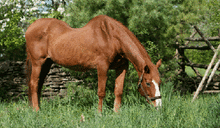Body condition and mobility are bigger determinants then physical age is when it comes to defining today’s equine senior horse, according to Laurie Cerny, editor of www.equineseniors.com.

A senior horse
Getty credited improvements in veterinary care, nutritional progression, and advancements with supplementation for common ailments like arthritis for keeping horses healthy and mobile longer.
© 2017 by Equine Guelph
In a recent interview with Juliet M. Getty, PhD, owner of Getty Equine Nutrition, LLC, about what makes a horse an equine senior, Cerny says the equine nutritional expert outlined the physical attributes that separates a senior horse from its younger peers.
“Genetics plays a significant role, but gene expression can be delayed if the horse is cared for all his life with proper nutrition, healthy activity, and reduced exposure to toxins, while living a low-stress life involving room to roam, companionship, and access for forage grazing,” Getty says.
“I’ve seen horses look and act “old” at 15 years of age, and others who are spry, bright-eyed, fully muscled, and energetic well into their late 20s/early 30s. So rather than look at the number, look at the horse.”
Getty also credited improvements in veterinary care, nutritional progression including more palatable feeds, and advancements with supplementation for common ailments like arthritis for keeping horses healthy and mobile longer.
“The age of senior demographics has changed - whether it's for humans or it's for horses,” Cerny said. “Fifteen, twenty years ago we thought people were old at 65 and a horse was old at 12 or 13. Today it’s more like 18 or 20 for a horse and 75 or 80 for humans.”
The complete interview with Dr. Getty can be read at www.equineseniors.com
www.equineseniors.com is devoted to the care and competition of equine senior horses. Find more articles and resources on caring for the senior horse, as well as product reviews, at the website.
